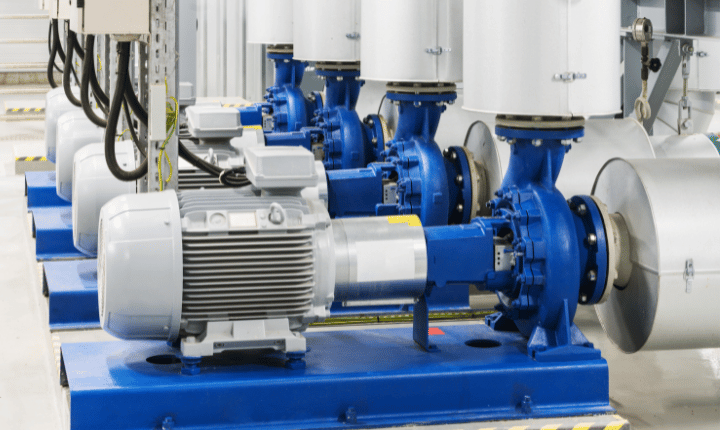Water pumps are essential to modern life, from providing clean drinking water to irrigation and sewage systems. However, many people need to learn how they work or the science behind their functionality. This guide aims to provide a beginner’s overview of the mechanics of water pumps, the different types available, and their pros and cons.
What Is a Water Pump And How Does It Work?
A water pump is a device that moves water from one location to another. It is used for various purposes, including providing clean drinking water, irrigating crops, and removing wastewater. Water pumps come in different types and sizes, but they all operate on the same basic principles. First, the water pump creates a pressure difference that causes water to move from an area of high pressure to an area of low pressure. This is accomplished by using an impeller, a rotating component that draws water into the pump and forces it out through a discharge port.
The impeller is powered by a motor, which can be electric, gas-powered, or even manual in some cases. As the impeller rotates, it creates a suction force that draws water into the pump through an inlet. The water is then forced out of the discharge port, where it can be directed to the desired location. Different types of water pumps use different mechanisms to create pressure differences. Centrifugal pumps, the most common type, use an impeller that rotates at high speeds to create a centrifugal force that moves water. Positive displacement pumps, on the other hand, use a reciprocating motion to move water.

The Different Types of Water Pumps And Their Uses
different types and sizes, each with unique features and advantages. However, the most common types of water pumps include centrifugal, positive displacement, and submersible pumps.
Centrifugal pumps are the most widely used type of water pump and are ideal for quickly moving large volumes of water. They use an impeller to create a centrifugal force that moves water from the inlet to the discharge port. These pumps are used for irrigation, domestic water supply, and firefighting. Positive displacement pumps, on the other hand, are better suited for low-flow rate applications where high pressure is required. They use a reciprocating motion to move water and are commonly used in industrial applications such as oil and gas, food and beverage, and chemical processing.
Submersible pumps are designed to be submerged in water and are commonly used in applications such as well pumping, drainage, and sewage removal. They are efficient and reliable and can move water from great depths.
Pros And Cons of Different Water Pump Types
Water pumps come in different types, each with its own set of advantages and disadvantages. Understanding the pros and cons of each type can help you choose the right pump for your specific application. Here are the pros and cons of some of the most common types of water pumps:
- Centrifugal Pumps:
Pros:
- Efficient at moving large volumes of water quickly
- Can handle high flow rates
- Easy to install and maintain
- Available in a wide range of sizes and materials
Cons:
- Not suitable for high-pressure applications
- It can be less efficient when used with viscous fluids
- Requires a power source to operate
- Positive Displacement Pumps:
Pros:
- Can handle high-pressure applications
- Ideal for low-flow rate applications
- Suitable for viscous fluids
- Self-priming and can run dry without damage
Cons:
- It can be more expensive than other types of pumps
- Requires careful maintenance to prevent damage to components
- Less efficient at handling high flow rates
- Submersible Pumps:
Pros:
- Efficient and reliable
- Ideal for applications where the pump needs to be submerged in water
- Can move water from great depths
- Quiet operation
Cons:
- More expensive than other types of pumps
- Difficult to repair or replace components when submerged
- Requires careful installation to prevent damage to components
- Solar-Powered Pumps:
Pros:
- Environmentally friendly and sustainable
- No operating costs once installed
- Easy to install and maintain
- Suitable for remote locations without access to a power source
Cons:
- Expensive initial investment
- Requires adequate sunlight to operate efficiently
- Less efficient at moving large volumes of water quickly
Choosing the right water pump type depends on your application needs and budget. By considering the pros and cons of each type, you can make an informed decision and ensure that your water pump operates efficiently and effectively.
Factors to Consider When Choosing a Water Pump
Choosing the right water pump for your specific application requires careful consideration of several factors. The flow rate is an important consideration, as it determines the amount of water the pump can move in a given period. The head pressure is also important to consider, as it determines the pressure required to move water from one point to another. The type of fluid being pumped is another important consideration, as some pumps are designed to handle specific types of fluids, while others are more versatile. Finally, the power source for the pump is also an important consideration, with electric pumps requiring access to an electrical outlet and gas-powered pumps being ideal for applications where no electrical source is available.
Maintenance requirements should also be considered, as some pumps require more frequent maintenance than others. Your budget is also an important factor to consider, as some pumps are more expensive than others. Other factors to consider include the following:
- The size and weight of the pump
- The level of noise produced by the pump
- The pump’s overall efficiency
By carefully considering these factors, you can choose the right water pump for your specific application and ensure it operates efficiently and effectively.
Maintenance And Troubleshooting Tips For Water Pumps
Proper maintenance ensures that your water pump operates efficiently and effectively. Regular maintenance tasks include:
- Checking the pump’s oil levels.
- Cleaning or replacing the air filter.
- Inspecting the pump’s components for signs of wear and tear.
It is also important to use the correct oil and fuel and follow the manufacturer’s recommended maintenance schedule. Troubleshooting tips include:
- Checking for clogs in the intake or discharge hoses.
- Checking for leaks in the pump’s components.
- Ensuring the pump is properly primed.
If you are experiencing issues with your water pump, it is important to consult the manufacturer’s manual or contact a professional for assistance. Following these maintenance and troubleshooting tips ensures your water pump has operated reliably and efficiently for years.
Pros of Water Pumps:
Efficiently Moves Water From One Location To Another.
Water pumps are designed to move water from one location to another efficiently. Whether you need to drain a swimming pool, pump water from a well, or rinse your crops, a water pump can help you do the job quickly and efficiently. By utilizing fluid mechanics principles, water pumps can create pressure and flow that moves water from a lower elevation to a higher elevation or from one location to another. With various pump types available, including centrifugal pumps, submersible pumps, and jet pumps, a water pump is suitable for virtually any application. By choosing the right pump and properly maintaining it, you can ensure that your water is efficiently moved to where it needs to be.
Can Operate In a variety of Environments And Conditions.
Water pumps are versatile machines that can operate in various environments and conditions. They are designed to withstand the rigors of harsh environments, from dusty construction sites to damp basements. Additionally, water pumps can operate in various temperature conditions, from freezing to extreme heat.
Some pumps are even designed to operate underwater or in highly corrosive environments. Furthermore, water pumps can handle various applications with the ability to handle different types of fluids, including clean water, sewage, and slurry. Furthermore, with proper maintenance, water pumps can operate reliably in challenging environments and conditions, making them valuable tools for various industries and applications.
Available In Different Sizes And Types To Fit Specific Needs
Water pumps are available in various sizes and types to fit specific needs. Depending on the application, a small, portable pump may be sufficient, or a larger pump may be necessary to handle larger volumes of water. Different pump types are also available, including centrifugal,
submersible, and jet pumps, each with unique features and capabilities. Some pumps are designed for specific applications, such as irrigation or construction, while others are designed for general use. By selecting the right pump for your specific needs, you can ensure it operates efficiently and effectively. Additionally, with technological advances, water pumps are becoming more efficient, with some models utilizing variable speed technology to reduce energy consumption and improve performance. With the wide range of sizes and types available, a water pump is suitable for virtually any application.
Reduces The Need For Manual Labor And Time
Water pumps are vital in reducing the need for manual labor and time when moving water. Before the advent of water pumps, moving water from one location to another often required manual labor and considerable time. However, with the help of a water pump, water can be moved quickly and efficiently without manual labor. This is particularly beneficial in applications such as irrigation, where large volumes of water need to be moved regularly. Additionally, water pumps can operate automatically, reducing the need for constant monitoring and allowing for greater efficiency. With the ability to move large volumes of water quickly and efficiently, water pumps have revolutionized many industries and applications, saving time and reducing the need for manual labor.
Cons of Water Pumps:
Can Be Expensive To Purchase And Maintain.
While water pumps can provide significant benefits, they can also be expensive to purchase and maintain. Depending on the size and type of pump, costs can range from a few hundred to several thousand dollars. In addition to the initial purchase cost, regular maintenance is required to ensure the pump operates efficiently and effectively. This includes changing the oil, replacing filters, and inspecting components for signs of wear and tear. Furthermore, repair costs can also be high if a pump breaks down. Nevertheless, water pumps remain valuable for many applications despite these costs, providing significant time and labour savings. Therefore, it is important to weigh the costs and benefits of a water pump before purchasing and properly maintaining it to maximize its lifespan and performance.
Some Types of Pumps Require a Power Source, Increasing Energy Costs.
Some types of water pumps require a power source, which can result in increased energy costs. Electric pumps, for example, require a source of electricity to operate and depending on the size and type of pump, the energy consumption can be significant. This is particularly true for pumps that run continuously or for extended periods. In addition to electricity, some pumps may require other energy sources, such as diesel or gasoline, which can increase operating costs. However, technological advances have led to the development of more energy-efficient pumps, with some models utilizing variable speed technology to reduce energy consumption and improve performance. Therefore, when selecting a water pump, it is important to consider the energy consumption and costs associated with the pump and choose a model appropriate for the application and budget.
Installation And Set-Pp Can Be Complicated For Some Types of Pumps.
Installation and set-up can be complicated for some water pump types, particularly those requiring a specific installation process. For example, submersible pumps must be installed to avoid damage, and jet pumps may require complex plumbing systems to operate correctly. Improper installation can result in decreased performance, increased energy consumption, and even damage to the pump. Additionally, some types of pumps may require additional equipment or components, such as pipes or valves, which can add to the complexity of the installation process. To avoid installation issues, following the manufacturer’s instructions carefully and seeking professional assistance if needed is important. While some pumps may require more complex installation and set-up, proper planning and preparation can ensure that the pump is installed correctly and operates efficiently.
Depending On The Type of Pump It May Require Regular Cleaning And Maintenance To Prevent Clogs Or Damage.
Regular cleaning and maintenance may be necessary to prevent clogs or damage, depending on the type of water pump. For example, pumps in wastewater or sewage applications are particularly susceptible to clogs from solid materials, such as paper, wipes, or other debris. Failure to properly maintain these pumps can result in clogs, decreased performance, and even damage to the pump.
Other types of pumps, such as those used in irrigation, may require regular cleaning to prevent the buildup of sediment or debris, which can decrease efficiency and performance. In addition to regular cleaning, pumps may require other types of maintenance, such as replacing worn components or checking for leaks. Proper maintenance is critical to ensure the pump operates efficiently and effectively and extends its lifespan. Therefore, it is important to follow the manufacturer’s maintenance and cleaning recommendations and seek professional assistance if needed.
Conclusion
Water pumps are an essential part of many systems we rely on daily. Understanding how they work and the different types available can help you choose the right pump for your needs and maintain it for optimal performance. By considering the pros and cons of each type of pump, you can make an informed decision and ensure that your water pump serves you well for years to come.












Commented Posts